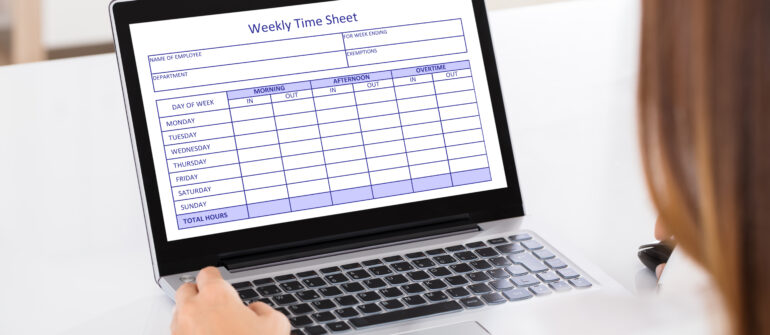The term ‘DCAA compliance’ when referring to your timekeeping procedures is often just thrown around. If you don’t understand what that means or how to verify that you are DCAA compliant, Hour Timesheet can help.
Simply put, DCAA stands for Defense Contract Audit Agency. This is the federal government agency responsible for conducting DCAA audits of the Department of Defense (DoD) contracts. As imagined, the DoD is very strict about its rules and regulations surrounding DCAA compliance and timekeeping. The DoD will award government contracts to businesses that use web-based timekeeping if they meet all requirements.
1. The company must document all timekeeping procedures in a policy or procedure handbook.
The employee handbook must address all critical elements of an adequate timekeeping system. Companies must provide all employees with an up-to-date policy or procedure handbook regarding time entry procedures.
2. Every employee must record all of his/her time daily.
Attempting to track time worked in advance or days after the fact is not acceptable. Hour Timesheet comes equipped with reminders and alerts to ensure employee time is entered daily. This means that no matter the size of the company, Hour Timesheet is equipped for every employee to track time. This DCAA timekeeping feature is especially useful for any companies participating in SBIR and STTR programs. They may be smaller businesses, but they must ensure they remain DCAA compliant to qualify for their funding.
3. All employees must record 100% of the time worked.
Whether working on a government contract or commercial work, all time worked must be accounted for. With the Hour Timesheet mobile app the employees and 1099’s can add time from anywhere, whether they’re working from home or the office.
4. Employees must record all indirect time not identifiable to a given project to proper indirect cost accounts (Overhead, G&A, B&P, R&D, etc.)
One example of an indirect cost is overhead. This usually includes the indirect costs involved in support operations or direct production. These costs are directly related to a project or projects. However, they cannot be allocated to one specific contract. This is because they overlap across many different projects.
5. Employees must record all PTO, vacation, sick, holiday, and other leave time to the proper leave accounts.
Hour Timesheet allows for leave tracking any kind
6. The system administrator(s) should initiate all job codes that appear in the timekeeping system.
Charge codes must be provided to employees authorized to work on a given project.
7. All timesheet entries must be recorded by the employee.
An employee must record their time based on work completed. They should track all time entries, irrespective of whether the time is billable or non-billable. This must happen daily.
8. Employees must charge to the appropriate project
Whenever the employee completes work or tasks, they must charge it accurately and directly to that project. Hour Timesheet can be setup to restrict which codes an employee can charge their time; therefore, an employee cannot charge to a project they have not been assigned.
9. Employees may not work on indirect tasks and record time as direct costs
An indirect task is work that is not explicitly tied to a project. To remain DCAA, compliant employees must never charge the time it takes to complete these tasks to any project. This would violate DCAA compliance and regulations
10. The employee is required to initiate all correction timesheet entries.
The employee must record all corrected timesheet data that includes a detailed audit trail. An audit trail is critical to remaining DCAA compliant.
The employee’s supervisor must approve every correction time entry in a detailed report, in the event of a DCAA audit.
In the unusual circumstances where the employee cannot make the changes to timesheets, then the HTS administrator may make such changes with the employee’s consent. The DCAA may analyze each entry on an employee’s timesheet. Thanks to your detailed audit trail, the DCAA will see who edited a time card after it was submitted. They will also be able to see when the changes were made, and why. Hour Timesheet creates an un-editable audit log that proper documentation. This activity log will include all of all the additions, deletions, approvals, and modifications made to your employees’ timesheets.
11. The employee’s supervisor must approve all employee timesheet data.
Each timesheet requires two signatures, in order to comply with DCAA compliance regulations. Hour Timesheet allows for online signatures at both the employee and manager levels.
12. All employees should be provided documented timekeeping training.
The company’s employee handbook or new-hire orientation program typically includes this training. Either way the employee should become familiar with the company’s timekeeping policy before they begin working.
13. In order to be DCAA compliant, the company must retain timesheet data for at least two years.
That means the company must be keep their files in a secure and easily accessible location. Should the DCAA require you to produce copies of your timesheets, they should be available. Hour Timesheet keeps the timesheets indefinitely for all employees, current, and past.
14. The company must conduct audit or floor checks randomly throughout the year to monitor employee timekeeping compliance.
Unfortunately, DCAA timekeeping compliance is one of the primary reasons government contractors fail an audit. Hour Timesheet can help. We have the employee and contractor time tracking experience to ensure total compliance. Sign up for Hour Timesheet today and work with an experienced implementation rep to review your account for total compliance. All for FREE.
